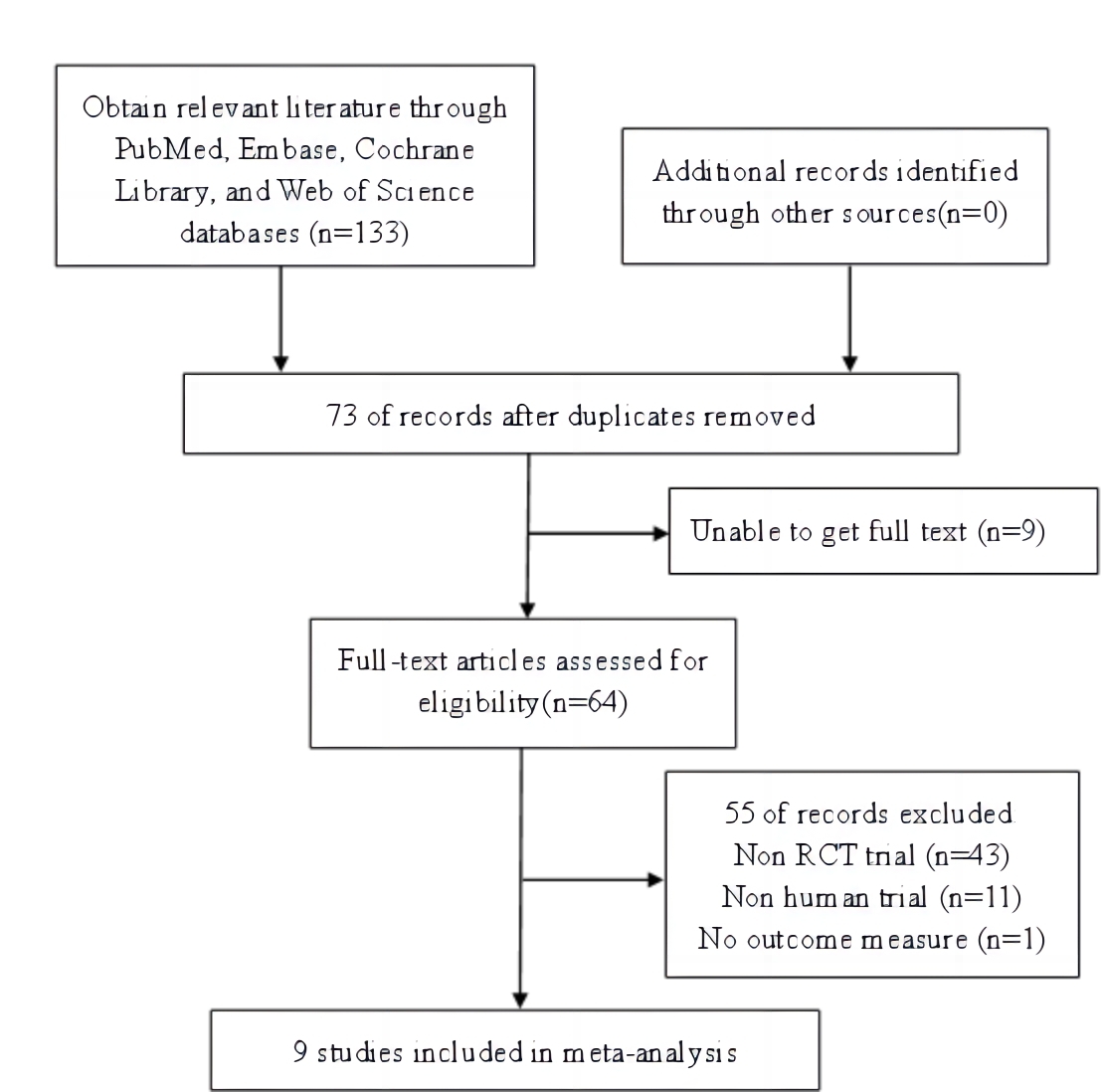Current issue
Archive
Manuscripts accepted
About the Journal
Editorial office
Editorial board
Section Editors
Abstracting and indexing
Subscription
Contact
Ethical standards and procedures
Most read articles
Instructions for authors
Article Processing Charge (APC)
Regulations of paying article processing charge (APC)
GASTROENTEROLOGY / RESEARCH PAPER
Efficacy and safety of proton pump inhibitors for diabetes mellitus in patients with gastroesophageal reflux disease: A meta-analysis
1
Dongying People's Hospital, China
These authors had equal contribution to this work
Submission date: 2024-05-22
Final revision date: 2024-07-23
Acceptance date: 2024-08-05
Online publication date: 2024-09-07
KEYWORDS
TOPICS
ABSTRACT
Introduction:
Gastroesophageal reflux disease (GERD) is prevalent in patients with type 2 diabetes mellitus (T2DM). The use of proton pump inhibitors (PPIs) is recognized as an effective method to reduce gastric acid secretion in patients with GERD. Nevertheless, whether PPIs are effective or safe for the treatment of T2DM complicated by GERD remains unknown.
Material and methods:
To assess the efficacy and safety of PPIs in the management of T2DM complicated with GERD, databases including Web of Science, Cochrane Library, PubMed, and Embase, were comprehensively searched for randomized controlled trials (RCTs) focusing on the treatment of T2DM complicated with GERD published before December 2023. Following data extraction and quality assessment, outcomes, including endoscopic efficiency, fasting blood glucose (FBG), symptom relief rates, levels of glycosylated hemoglobin A1c (HbA1c), and the incidence of adverse reactions, were analyzed using RevMan 5.4.
Results:
The results suggest that the PPI group exhibited a higher efficacy rate compared to the control group in endoscopic efficiency (69.32% vs. 5.45%, OR: 40.50, 95%CI: 18.77¬–87.39), symptom relief rates (92.94% vs. 54.65%, OR: 6.45, 95%CI: 3.41–12.20). Furthermore, PPI treatment was associated with a significant reduction in HbA1c levels (WMD=-0.41, 95%CI: −0.68 to −0.14) and FBG levels (WMD=−10.15 mg/dL, 95%CI: −19.64 to −0.66) in patients with T2DM complicated with GERD. In terms of safety, the incidence of adverse reactions was not significantly different between the two groups (PPI group: 10.78% vs. control group:11.88%, P>0.05).
Conclusions:
PPIs can effectively improve the glycemic index of patients with T2DM complicated with GERD.
Gastroesophageal reflux disease (GERD) is prevalent in patients with type 2 diabetes mellitus (T2DM). The use of proton pump inhibitors (PPIs) is recognized as an effective method to reduce gastric acid secretion in patients with GERD. Nevertheless, whether PPIs are effective or safe for the treatment of T2DM complicated by GERD remains unknown.
Material and methods:
To assess the efficacy and safety of PPIs in the management of T2DM complicated with GERD, databases including Web of Science, Cochrane Library, PubMed, and Embase, were comprehensively searched for randomized controlled trials (RCTs) focusing on the treatment of T2DM complicated with GERD published before December 2023. Following data extraction and quality assessment, outcomes, including endoscopic efficiency, fasting blood glucose (FBG), symptom relief rates, levels of glycosylated hemoglobin A1c (HbA1c), and the incidence of adverse reactions, were analyzed using RevMan 5.4.
Results:
The results suggest that the PPI group exhibited a higher efficacy rate compared to the control group in endoscopic efficiency (69.32% vs. 5.45%, OR: 40.50, 95%CI: 18.77¬–87.39), symptom relief rates (92.94% vs. 54.65%, OR: 6.45, 95%CI: 3.41–12.20). Furthermore, PPI treatment was associated with a significant reduction in HbA1c levels (WMD=-0.41, 95%CI: −0.68 to −0.14) and FBG levels (WMD=−10.15 mg/dL, 95%CI: −19.64 to −0.66) in patients with T2DM complicated with GERD. In terms of safety, the incidence of adverse reactions was not significantly different between the two groups (PPI group: 10.78% vs. control group:11.88%, P>0.05).
Conclusions:
PPIs can effectively improve the glycemic index of patients with T2DM complicated with GERD.
We process personal data collected when visiting the website. The function of obtaining information about users and their behavior is carried out by voluntarily entered information in forms and saving cookies in end devices. Data, including cookies, are used to provide services, improve the user experience and to analyze the traffic in accordance with the Privacy policy. Data are also collected and processed by Google Analytics tool (more).
You can change cookies settings in your browser. Restricted use of cookies in the browser configuration may affect some functionalities of the website.
You can change cookies settings in your browser. Restricted use of cookies in the browser configuration may affect some functionalities of the website.



